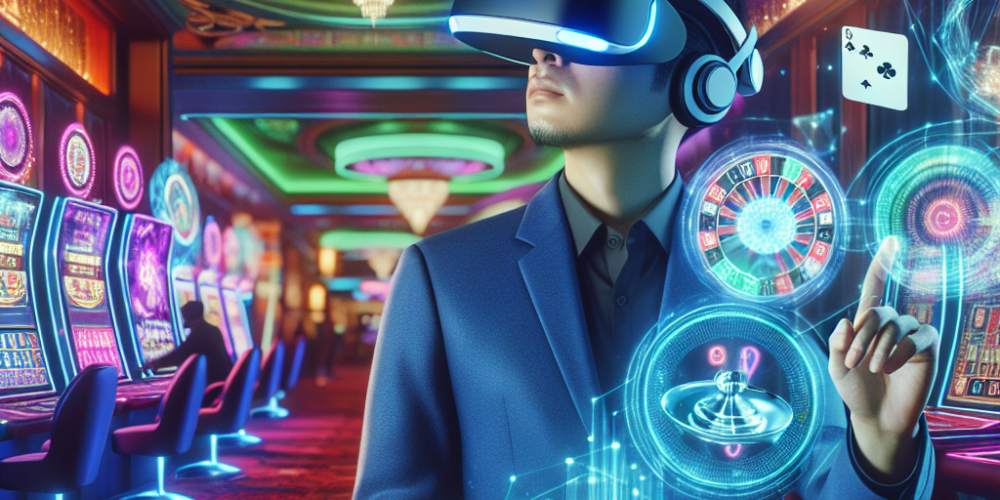In recent years, the intersection of technology and gambling has paved the way for a new frontier in the gaming industry: virtual reality (VR) casinos. As the digital landscape evolves, these immersive platforms are transforming traditional gambling experiences, offering players an innovative way to engage with their favorite casino games. This surge in VR casino popularity is not just a fleeting trend but a glimpse into the future of gambling.
Virtual reality technology has matured significantly over the last decade, leading to more sophisticated and accessible VR systems. Companies like Oculus, Valve, and Sony have developed headsets that transport users into convincingly real environments—a technological leap that has caught the eye of casino game developers and operators. The result is a growing number of VR casinos that replicate the thrilling atmosphere of physical casinos, complete with detailed interiors and interactive gaming tables.
The allure of VR casinos lies in their ability to provide an engaging, interactive experience. Players can walk through digitally recreated casino floors, interact with other players and live dealers, and engage in games like blackjack, poker, and slots in a fully immersive environment. This level of interaction goes beyond what traditional online casinos and even live dealer games can offer, making it a compelling option for those seeking a more engaging gambling experience.
One of the pivotal advantages of VR casinos is the blend of convenience and authenticity. Users can enjoy the experience of visiting a casino without leaving their homes, which is a significant draw in today’s convenience-driven consumer culture. Especially in the context of pandemic-related restrictions, VR casinos offer a safe and accessible alternative to crowded physical casinos.
Industry experts predict significant growth in the VR casino sector over the next few years. According to recent market analysis, the global virtual reality in gaming market size is expected to grow substantially, driven by increasing investments in VR technology and the rising popularity of online gaming. Casinos are investing in this technology to capture the younger demographic of gamblers who seek dynamic and technology-driven gambling experiences.
Despite its numerous benefits, the rise of VR casinos also presents challenges. Regulatory issues are at the forefront, as governments and gambling authorities need to adapt existing frameworks to accommodate the unique aspects of virtual reality gambling. There is also the concern of ensuring fairness and security in a digital environment, which is paramount to maintaining player trust.
Moreover, there is the issue of accessibility. While VR headset prices have been decreasing, the cost is still prohibitively high for a segment of potential users. Additionally, there may be a learning curve associated with using VR technology, particularly for those who are not tech-savvy.
To address these challenges, industry stakeholders are increasingly collaborating with technology developers to improve the VR gambling experience. This includes making VR headsets more affordable and user-friendly and enhancing the security features of VR casinos to protect users from potential cyber threats.
The social aspect of gambling has also been a significant focus in the development of VR casinos. Features allowing players to interact with each other in real-time, share experiences, and even enjoy group games are becoming standard. These social elements are crucial as they replicate one of the most beloved aspects of casino gambling—the camaraderie and excitement of playing games with others.
As VR technology continues to evolve, the potential for even more innovative applications in gambling is immense. Future advancements could include more personalized and interactive gaming experiences, enhanced graphical interfaces, and even more seamless integration with mobile devices.
In conclusion, virtual reality casinos are setting the stage for a significant transformation in the gambling industry. By offering an immersive, interactive, and convenient gambling experience, VR casinos not only appeal to traditional gamblers but also to a new generation that values innovative technology. As VR technology becomes more mainstream, it promises to revolutionize the way people gamble, making virtual betting a substantial part of the future of gaming.

David Farbacu is a seasoned writer with a passion for games, gaming, casinos, and Xbox. With a wealth of experience in the industry, David brings insightful reviews, comprehensive guides, and engaging articles that cater to both casual gamers and hardcore enthusiasts. His expertise spans across various gaming platforms and genres, making him a go-to source for the latest trends and developments in the gaming world.

